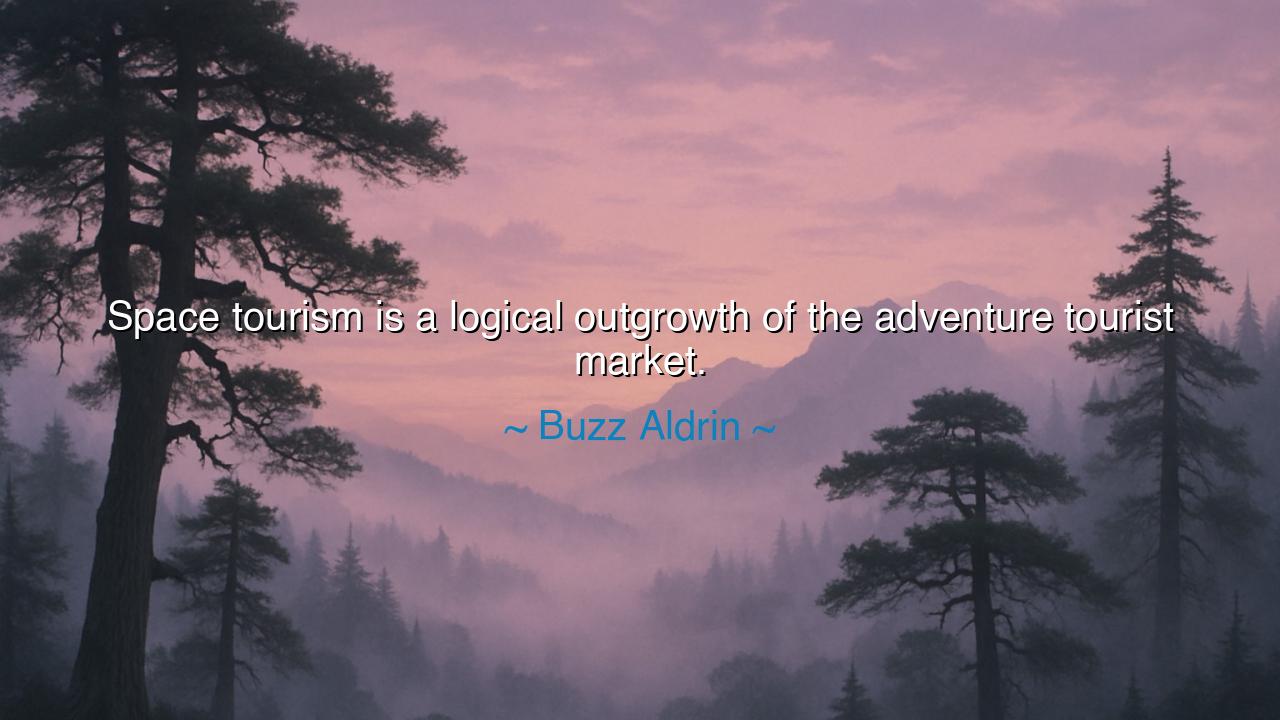
Space tourism is a logical outgrowth of the adventure tourist






Hearken, O seekers of wonder, to the words of Buzz Aldrin, a traveler of the heavens, who declared: “Space tourism is a logical outgrowth of the adventure tourist market.” Do not take these words as the idle musings of a dreamer, but as the vision of one who set foot upon the Moon, who gazed upon the Earth as a fragile jewel suspended in darkness. In this saying lies both prophecy and challenge, for it speaks to the eternal hunger of the human spirit—to go farther, to climb higher, to reach beyond the horizons that others declare impossible.
From the dawn of time, mankind has been driven by the call of the adventure tourist—those souls who sought more than comfort, who longed for the unknown. The wanderers who crossed deserts, the sailors who braved storm-tossed seas, the mountaineers who placed their flags upon snowbound peaks—these were the forerunners of space explorers. Just as Marco Polo ventured into lands unseen by his countrymen, and Edmund Hillary ascended the mighty Everest, so too will the daring few ascend into the black oceans of the sky, not as astronauts of nations, but as citizens of the world, chasing awe and wonder for their own sake.
In truth, Aldrin’s words are rooted in the logic of history. The caravans that once traced the Silk Road carried not only merchants, but adventurers who sought sights and marvels unknown. The steamship and the railroad opened new frontiers, and with them, the age of tourism was born. And when the airplane conquered the skies, what once was perilous became routine. So too will the rockets that today seem only for the chosen few one day bear ordinary travelers into the heavens. The outgrowth is natural, for the desire to journey is sown deep in the soil of the human heart.
Consider the tale of Dennis Tito, the first private space tourist. In the year 2001, he paid a great fortune to soar aboard a Russian craft to the International Space Station. Many scoffed, calling it frivolous, calling it wasteful. Yet in truth, his journey marked a turning point—the moment when the heavens ceased to be the exclusive domain of governments and became, at last, a horizon open to the people. Just as the first passengers on ocean liners heralded a new age of travel, so too did Tito’s flight announce the dawn of space tourism. What was once myth began to unfold as reality.
Yet Aldrin’s words carry more than economic sense—they resound with the majesty of destiny. For when he speaks of space tourism, he is not merely describing pleasure voyages, but the inevitable expansion of mankind’s presence into the cosmos. Adventure is the fire that keeps the spirit alive; without it, civilizations decay. If our ancestors had not ventured from caves, from forests, from homelands into the unknown, humanity would have remained small. So too now: if we do not turn our gaze to the stars, if we do not seek to dwell beyond our cradle, then we deny the very essence of who we are.
But let us not mistake this vision as belonging only to the wealthy or the privileged. The essence of Aldrin’s teaching is for all: adventure is not limited to those who board rockets. Each person must find their own “space tourism”—their own leap beyond the familiar. For some, it may be the pursuit of knowledge, for others the creation of art, for others still the courage to live authentically in a world that demands conformity. The lesson is this: seek the unknown, for it is there that life is most fully lived.
Practical action lies before you. Cultivate curiosity, dare to step outside the safe borders of your existence, and honor those who lead humanity into greater frontiers. Support the dreamers, the builders, the explorers, for their journeys open doors for all. And in your own life, look to the “stars” within reach: the challenges, the goals, the possibilities that stagger your heart. Strive toward them with the spirit of the adventurer, knowing that each small leap prepares humanity for its greatest leaps yet.
So remember the wisdom of Buzz Aldrin: space tourism is not merely a market, but a mirror of the eternal human thirst for wonder. As the caravans gave way to ships, and the ships to planes, so will the planes give way to rockets. And through it all, one truth endures—mankind was born to wander, born to seek, born to journey ever onward, until even the stars themselves become familiar ground.






AAdministratorAdministrator
Welcome, honored guests. Please leave a comment, we will respond soon